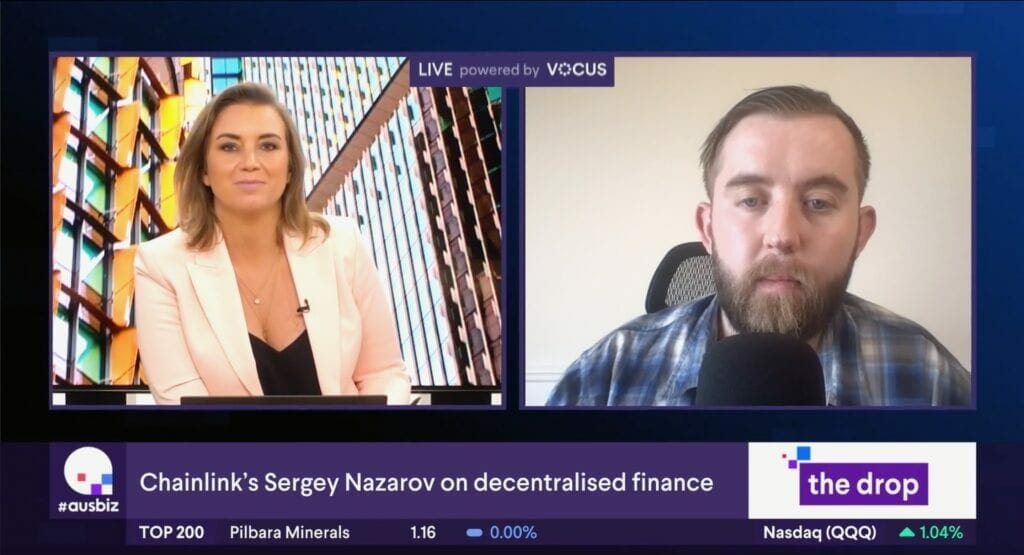Last week, Chainlink Co-Founder Sergey Nazarov spoke to ausbiz TV’s Kara Ordway about how fast the decentralized finance (DeFi) space is growing and the forces accelerating its trajectory.
“It’s growing unbelievably quickly,” Nazarov said. In just the past year, DeFi has increased from $1 billion to over $50 billion Total Value Locked (TVL) and Nazarov “wouldn’t be surprised” if that number jumped to $500 billion sometime within the next year.
$500 billion would amount to 25% of the current cryptocurrency market value, which topped $2 trillion for the first time last week. Though DeFi is still in its “very early days,” Nazarov believes the superior nature of DeFi products is only limited by the speed at which people learn about and can adopt them.
“I expect that trajectory of growth to continue, both because there’s a lot of value in the cryptocurrency format that can be put into a DeFi product and also because it’s such a superior financial product.”

For those who are new to DeFi, Nazarov recommended two powerful user-friendly protocols – Aave, a decentralized lending protocol where depositors can earn passive income, and Synthetix, a derivatives protocol where anyone can gain on-chain exposure to a diverse range of assets.
Nazarov noted that the derivatives market, often estimated at $1 quadrillion, presents a particularly exciting opportunity for derivatives in blockchain format.
“I expect both lending and derivatives to be cornerstones of DeFi and protocols like Aave and Synthetix are making them immediately usable and easily consumable by thousands and thousands of users,” Nazarov said. As the number of DeFi users grows, the amount of value locked in DeFi will naturally follow.
Ordway asked, “Smart contracts are the future, aren’t they?”
“I think they’re absolutely the future, simply because they provide so much risk management and clarity about what’s going on with a financial product,” Nazarov said.
He sees two forces driving the entire global financial system towards smart contracts: yield and transparency. Protocols like Aave provide much higher yield with less risk than the traditional financial market. Because they are based on math instead of trust, smart contracts afford users a much higher level of transparency than traditional financial products; Nazarov said this will ultimately drive demand from the global financial system.
“It’s that clarity that creates efficient markets, risk management and a well-functioning global financial system. And there’s no better system for creating clarity, transparency and risk management than smart contracts.”
Just as traditional banks and financial institutions are now offering Bitcoin, Nazarov believes it will soon be much easier for people to take advantage of DeFi products. “Banks will funnel value into those protocols because, at the end of the day, the financial product created by them is so superior,” he said.
While people living in developed markets can participate in DeFi now on their own, Nazarov sees a proliferation of “on-ramps” that will further accelerate DeFi’s TVL and mainstream adoption. He predicts access to DeFi products will be “very well polished” by this time next year.
When it comes to individuals living in emerging markets, the time frame might be a little bit longer. “But I don’t think it’s as long as people think,” Nazarov said. “The powerful thing about smart contracts is that all you need to participate in a smart contract is internet access.”
Elizabeth Licorish is a writer and author whose work has appeared in HuffPost, PhillyVoice and Bustle. In 2008, she wrote and co-authored Innovation for Underdogs. In 2010, she wrote and edited Charles Manson Now. She received her MFA in creative nonfiction from Rutgers University and has ghostwritten hundreds of executive thought leadership pieces for some of the world’s leading experts across diverse industries. She has been writing and editing for influential blockchain projects since 2017, when she fell in love with decentralized finance’s potential to empower individuals in an economically just world. As the editor-in-chief of Chainlink Today, she’s passionate about telling the human stories behind some of the most promising technology in the fastest-growing blockchain ecosystem.


